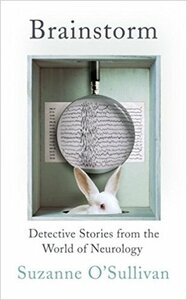Take a photo of a barcode or cover
Written a la Oliver Sacks and procedural discovery show, O’Sullivan details stories about the clinical/human parts of brain science. She does a good job interspersing the science behind it in a way that was understandable and relevant. It really reinforced to me that epilepsy is such a broad and complex thing (with vastly different kinds and presentations- based on region, lesion, progression, age, etc etc etc) but also of its historical importance in moving forward brain science. I also enjoyed the whole treatment of the patient as a person and what the choices and decisions and difficulties look for them & how much of a detective a neurologist must be to treat these rare cases.
I was really fascinated by the video telemetry units and the interplay between all the brain scientists/clinicians and all the very many steps and trials needed. I definitely could’ve read way more case studies— learning about the brain is such a treat and a frontier.
I was really fascinated by the video telemetry units and the interplay between all the brain scientists/clinicians and all the very many steps and trials needed. I definitely could’ve read way more case studies— learning about the brain is such a treat and a frontier.
emotional
informative
inspiring
reflective
medium-paced
informative
inspiring
mysterious
fast-paced
informative
inspiring
fast-paced
hopeful
informative
reflective
medium-paced
An interesting look at brain science and epilepsy, written by a specialist in the field. The author presents numerous case studies that illustrates the wide range of manifestations of epilepsy and how difficult it can be to diagnose and treat. She interspersed the case studies with descriptions of the science of the brain (in an interesting accessible way).
informative
fast-paced
funny
informative
reflective
relaxing
fast-paced
Although it's subtitled "Detective Stories From the World of Neurology", Suzanne O'Sullivan's new book, Brainstorm, is really a series of case studies of epilepsy. "Detective stories" isn't too far off, though: all stories of diagnosis are stories of detection (this is made abundantly clear in, for instance, the structure of each episode of House; it's also maybe why Hugh Laurie's character in it has the substance abuse and anger management/personal life issues that we expect from our noir detectives; discuss.) In twelve chapters, each focusing on one of O'Sullivan's patients, we get glimpses of epilepsy symptoms that are rare, misunderstood, misdiagnosed, and sometimes not epilepsy at all. At the very least, Brainstorm is a very illuminating book about what seizures sometimes look like, and the ways in which they can be completely misinterpreted by the public. One of her patients, for instance, gets a kind of localised Tourette's; his seizures involve swearing and spitting. If he has a seizure in public, he risks not only disapproval and embarrassment, but arrest. (I wanted more of this from O'Sullivan, actually. She doesn't, for example, acknowledge that her black male patients face a much higher chance of being arrested, injured or killed for displaying abnormal social behaviour.)
There is a certain level of voyeuristic fascination in O'Sullivan's case studies that drives readerly interest. We learn about August, a bright young woman whose seizures make her compulsively bolt from rooms and across streets; Maya, an elderly Nigerian woman who suffers blackouts and sometimes finds herself miles from home; Wahid, whose family paid thousands to various local healers and pastors before his condition was diagnosed not as spirit possession but as epilepsy. O'Sullivan is simultaneously compassionate and objective about each of her patients: she clearly cares for their well-being, but also strives to view the evidence as thoroughly and impartially as possible. Her notes on the development of technology used in diagnosing neurological problems - CAT scans, MRI and fMRI machines, the merits and demerits of brain surgery - are informative, detailed and accessible. Sometimes there's a slight stiffness to the prose, but she's a doctor who writes, not a professional poet, and it's a small price to pay for the rest of the book's informativeness and optimistic outlook on the future of neurology.
There is a certain level of voyeuristic fascination in O'Sullivan's case studies that drives readerly interest. We learn about August, a bright young woman whose seizures make her compulsively bolt from rooms and across streets; Maya, an elderly Nigerian woman who suffers blackouts and sometimes finds herself miles from home; Wahid, whose family paid thousands to various local healers and pastors before his condition was diagnosed not as spirit possession but as epilepsy. O'Sullivan is simultaneously compassionate and objective about each of her patients: she clearly cares for their well-being, but also strives to view the evidence as thoroughly and impartially as possible. Her notes on the development of technology used in diagnosing neurological problems - CAT scans, MRI and fMRI machines, the merits and demerits of brain surgery - are informative, detailed and accessible. Sometimes there's a slight stiffness to the prose, but she's a doctor who writes, not a professional poet, and it's a small price to pay for the rest of the book's informativeness and optimistic outlook on the future of neurology.
challenging
informative
medium-paced


